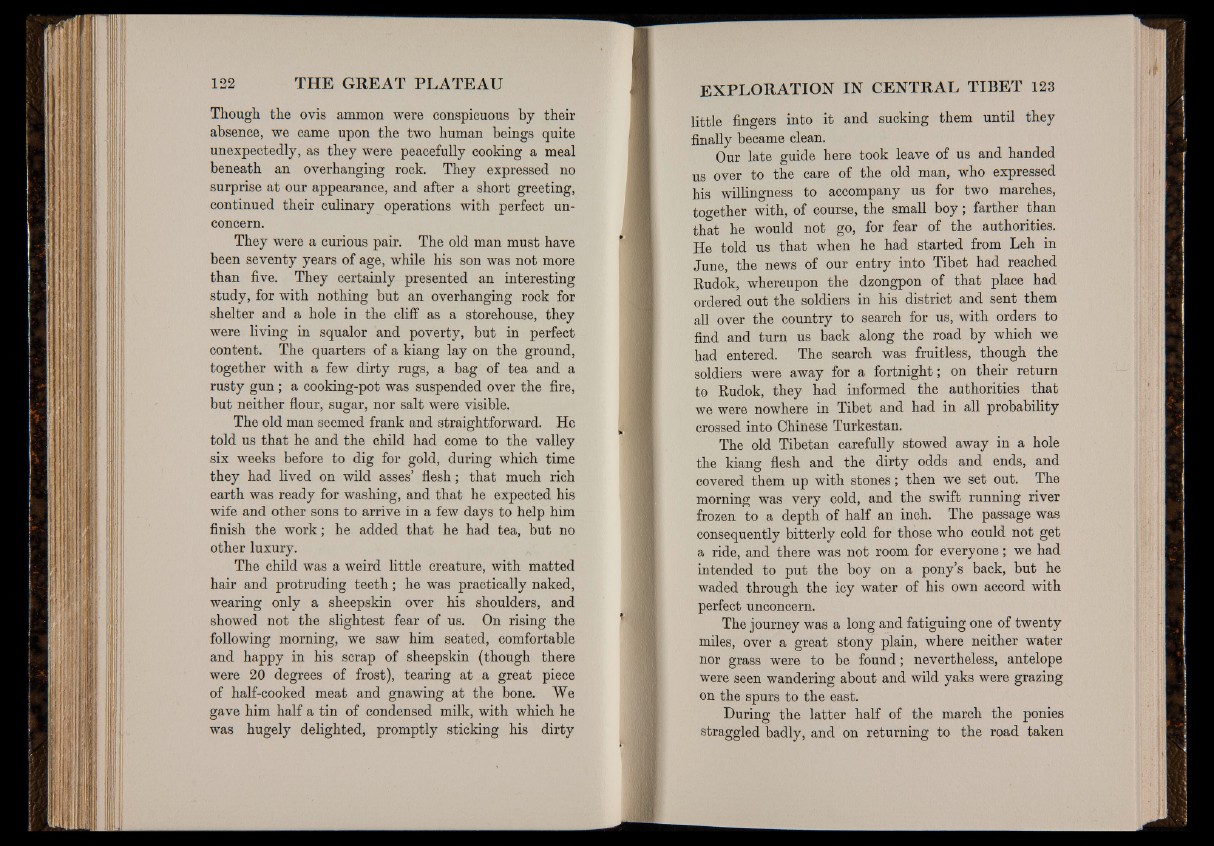
Though the ovis ammon were conspicuous by their
absence, we came upon the two human beings quite
unexpectedly, as they were peacefully cooking a meal
beneath an overhanging rock. They expressed no
surprise at our appearance, and after a short greeting,
continued their culinary operations with perfect unconcern.
They were a curious pair. The old man must have
been seventy years of age, while his son was not more
than five. They certainly presented an interesting
study, for with nothing but an overhanging rock for
shelter and a hole in the cliff as a storehouse, they
were living in squalor and poverty, but in perfect
content. The quarters of a kiang lay on the ground,
together with a few dirty rugs, a bag of tea and a
rusty gun ; a cooking-pot was suspended over the fire,
but neither flour, sugar, nor salt were visible.
The old man seemed frank and straightforward. He
told us that he and the child had come to the valley
six weeks before to dig for gold, during which time
they had lived on wild asses’ flesh; that much rich
earth was ready for washing, and that he expected his
wife and other sons to arrive in a few days to help him
finish the work; he added that he had tea, but no
other luxury.
The child was a weird little creature, with matted
hair and protruding te e th ; he was practically naked,
wearing only a sheepskin over his shoulders, and
showed not the slightest fear of us. On rising the
following morning, we saw him seated, comfortable
and happy in his scrap of sheepskin (though there
were 20 degrees of frost), tearing at a great piece
of half-cooked meat and gnawing at the bone. We
gave him half a tin of condensed milk, with which he
was hugely delighted, promptly sticking his dirty
little fingers into it and sucking them until they
finally became clean.
Our late guide here took leave of us and handed
us over to the care of the old man, who expressed
his willingness to accompany us for two marches,
together with, of course, the small boy; farther than
that he would not go, for fear of the authorities.
He told us that when he had started from Leh in
June, the news of our entry into Tibet had reached
Rudok, whereupon the dzongpon of that place had
ordered out the soldiers in his district and sent them
all over the country to search for us, with orders to
find and turn us back along the road by which we
had entered. The search was fruitless, though the
soldiers were away for a fortnight; on their return
to Rudok, they had informed the authorities that
we were nowhere in Tibet and had in all probability
crossed into Chinese Turkestan.
The old Tibetan carefully stowed away in a hole
the kiang flesh and the dirty odds and ends, and
covered them up with stones; then we set out. The
morning was very cold, and the swift running river
frozen to a depth of half an inch. The passage was
consequently bitterly cold for those who could not get
a ride, and there was not room for everyone; we had
intended to put the boy on a pony’s back, but he
waded through the icy water of his own accord with
perfect unconcern.
The journey was a long and fatiguing one of twenty
miles, over a great stony plain, where neither water
nor grass were to be found; nevertheless, antelope
were seen wandering about and wild yaks were grazing
on the spurs to the east.
During the latter half of the march the ponies
straggled badly, and on returning to the road taken